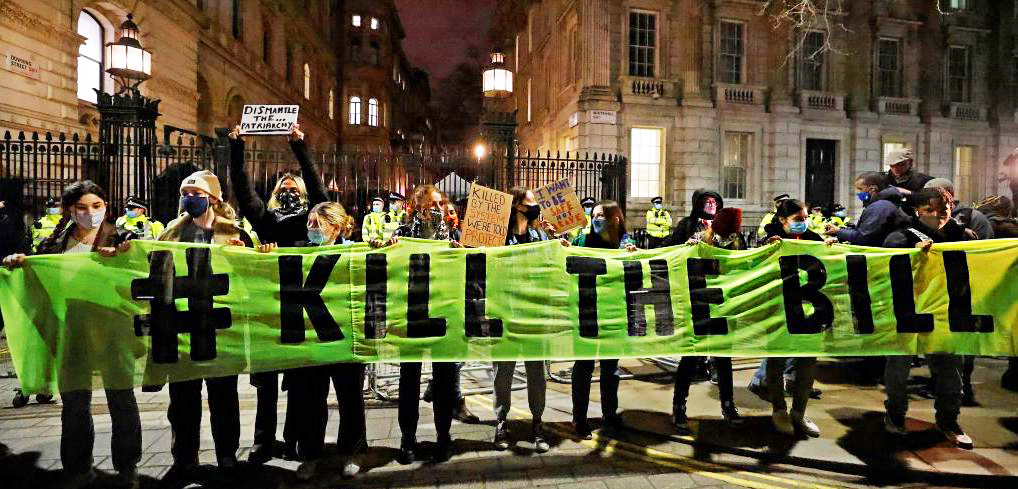The “anti-protest bill,” as the Police, Crime, Sentencing and Courts Bill has been nicknamed, stands accused of undermining the fundamental rights of citizens. But when a Government proposes illiberal new criminal legislation, they often invoke the same defence in response to the resulting outrage: that they’re simply modernising a pre-existing law — and making it fit-for-purpose in the twenty-first century.
The riposte is all the stronger when the law to be updated is part of the “Common Law” — the law that exists only by virtue of long use, never formally agreed to by parliament. These crimes are often said to be unfairly vague, even circular: a jury trying an allegation of Gross Negligence Manslaughter, for instance, will be told that the defendant is guilty if his conduct was so bad as to be, in their judgment, criminal. In other words: find him guilty if you think he should be found guilty.
Public Nuisance — often used to prosecute unruly protesters — is an offence of this kind. It’s not quite circular, but a definition must be cobbled together from a couple of centuries’ worth of inconsistent appeal court judgments. Textbooks make that task easier, but nevertheless, a jury is likely to be left with a far greater sense of “over to you” than when a judge is reading from a statute.
So in 2015 the Law Commission suggested putting Public Nuisance into an Act of Parliament. Only now — as they contemplate the imminent release of tens of millions of frustrated people— is the Government finally following that recommendation. That the first debate should take place immediately after the disgusting police violence against women at Clapham Common is a misfortune, to say the least.
Is the law of Public Nuisance being made stricter? On the surface, not really. According to the criminal practitioners’ textbook, the Common Law offence can be committed merely by “endangering the comfort” of the public; whereas the lowest threshold in the new Bill involves putting a person “at risk of suffering…serious annoyance” — and there’s a “reasonable excuse” defence on offer too.
But on a practical level, the position is different. For one thing, this is a statement of intent. Like a new exercise bike, a new law is more likely to be used, even if the old one wasn’t broken. But the way it is used will also change. To enshrine a vague old Common Law offence in statute is to revivify it. Common Law offences are treated with circumspection, discretion, and a sense of proportion. A judge is unlikely to rely too heavily on a phrase like “endanger the comfort” when directing a jury: rather, the twelve fact-finders will be encouraged to look at the thing in the round, and use their judgment. In contrast, brand new statutes are treated with clinical obeisance: a corpus of convention has not had time to develop around them. “Serious annoyance” — those words will stand starker, and do more.
But it’s in the surrounding changes to the law on protests that the Government’s intentions are most visible. Police have long been able to impose conditions on protestors (on pain of criminal conviction) if they foresee a risk of, among other things, “serious disruption”. But now the Government wants more: the power to use Regulations, whenever they fancy, to “change the meaning” of that expression.
Do the Conservatives think they’ll be in charge forever? They might want to consider the possibility that the other lot might be the ones making ad hoc redefinitions of “serious disruption” before long.
And then there are the hasty, silly, unprecedented little try-it-ons we have come to expect from a post-millennial criminal statute. Not satisfied with existing powers to deal with serious disorder and disruption, they want to be able to ban protests that involve noise that might cause serious unease. But aren’t these the minimum standards for qualification as a protest? If noise and unease are proscribed, might violence and property damage become more attractive?
You could argue that what protesting needs is a bit more illegality. Where’s the civil disobedience in wandering around Hyde Park with your kids, waving cardboard cringe around for Instagram? As Lord Hoffman put it in 2006, it is by accepting criminal penalties that some protestors “vouch the sincerity of their beliefs”. But he also spoke approvingly of a traditional sense of proportion, on both sides of the barricade.
As that other advocate of judicial proportion, Lord Sumption, said in his Cambridge lecture in October last year, “The British public has not even begun to understand the seriousness of what is happening to our country”. Perhaps, with the laying of this Bill, they can now make a start. After 12 months of governing by decree, banning the right to protest along the way, the Government seem to have developed a taste for it.











Join the discussion
Join like minded readers that support our journalism by becoming a paid subscriber
To join the discussion in the comments, become a paid subscriber.
Join like minded readers that support our journalism, read unlimited articles and enjoy other subscriber-only benefits.
Subscribe